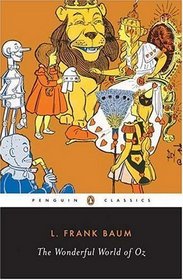Kathy S. (jjmjgj) reviewed The Wonderful World of Oz : The Wizard of Oz, The Emerald City of Oz, Glinda of Oz (Penguin Classics) on + 273 more book reviews
Helpful Score: 1
From back cover:
"Most people are familiar with the land of Oz by way of the classic 1939 film. But the film was based on only the first of fourteen books about Oz in which Baum developed his vision of a socialist paradise and which garnered an immense and loyal following. Three of the novels are collected here. "The Wizard of Oz" (1900) introduces Dorothy, who arrives from Kansas and meets the Scarecrow, the Tin Woodman, the Cowardly Lion, and a host of other characters. "The Emerald City of Oz (1910) finds Dorothy, Aunt Em, and Uncle Henry coming to Oz just as the wicked Nome King is plotting to conquer its people. In Baum's final novel, "Glinda of Oz" (1920), Dorothy and Princess Ozma try to prevent a battle between the Skeezers and the Flatheads. Tapping into a deeply rooted desire in himself and his readers to live in a peaceful country in which relationships were based not on commodity exchange but on the sharing of talents and gifts, Baum's imaginative creation, like all great utopian literature, holds out the possibility for change."
"Most people are familiar with the land of Oz by way of the classic 1939 film. But the film was based on only the first of fourteen books about Oz in which Baum developed his vision of a socialist paradise and which garnered an immense and loyal following. Three of the novels are collected here. "The Wizard of Oz" (1900) introduces Dorothy, who arrives from Kansas and meets the Scarecrow, the Tin Woodman, the Cowardly Lion, and a host of other characters. "The Emerald City of Oz (1910) finds Dorothy, Aunt Em, and Uncle Henry coming to Oz just as the wicked Nome King is plotting to conquer its people. In Baum's final novel, "Glinda of Oz" (1920), Dorothy and Princess Ozma try to prevent a battle between the Skeezers and the Flatheads. Tapping into a deeply rooted desire in himself and his readers to live in a peaceful country in which relationships were based not on commodity exchange but on the sharing of talents and gifts, Baum's imaginative creation, like all great utopian literature, holds out the possibility for change."




![header=[] body=[Get a free book credit right now by joining the club and listing 5 books you have and are willing to share with other members!] Help icon](/images/question.gif?v=90afaeb39)
